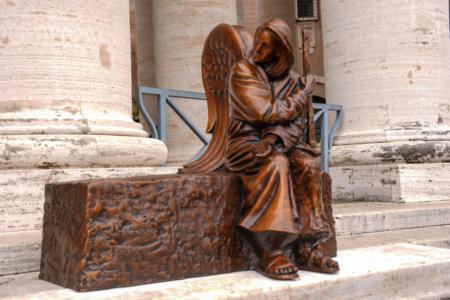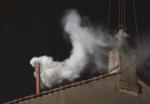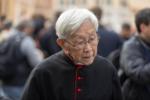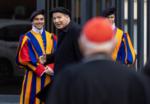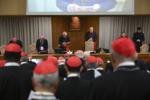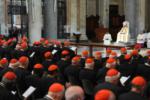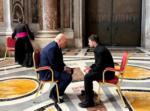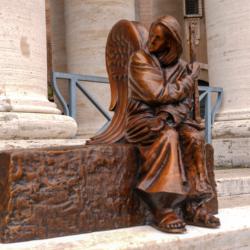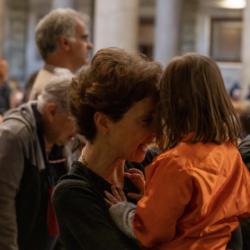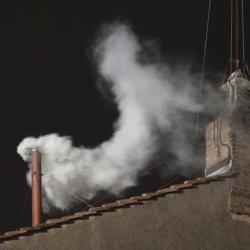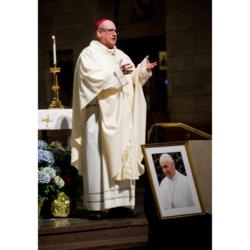Deacons uniquely positioned to promote healing in closures
At the Jubilee Year celebration for deacons in the Vatican, Archbishop Roberto O. Gonzalez, Archbishop of San Juan, Puerto Rico and former auxiliary bishop of Boston, said the role of the permanent deacon is to “act as a herald: the angel of Evaghelismos, that is to say of Annunciation. [He] is a new Gabriel who proclaims the good news of salvation.”
In the case of reconfiguration in the Archdiocese of Boston, Deacon Leo Donoghue, director of the Office of the Permanent Diaconate, feels that permanent deacons have largely lived up to their call.
"Even the smoothest transition must face the inevitable feelings of sadness and loss," Deacon Donoghue told The Pilot. "But permanent deacons, because they are both parishioners and clergy, are really well-positioned to be agents of healing -- and for the most part, they have been."
According to Deacon Donoghue, 19 permanent deacons have been, or are expected to be, directly affected by parish closures. Upon suppression of his parish, each permanent deacon will be reassigned by the archbishop, he explained.
"We recommend, but don't insist, that the permanent deacon go with his parishioners to the welcoming parish," in order to ease the transition, he said.
"It is really a hard place for them to be," stressed Deacon Donoghue, "but, for the most part, deacons have been part of the healing process."
One permanent deacon whose parish is slated to close is Deacon Charles Cornell of St. Isidore Parish in Stow. Although the parish is being suppressed, the church building will remain open as a worship site under the care of St. Michael Parish in neighboring Hudson.
"My experience is similar to a number of deacons in parishes being suppressed in that I am not only the assigned permanent deacon, but I am also a long-time parishioner," said Deacon Cornell.
Deacon Cornell has been a parishioner at St. Isidore for the past 29 years and a permanent deacon there since his ordination in 1992.
"There is sadness," he attested, "especially with all the memories --weddings, baptisms and the like -- that we feel we'll be losing."
"And yet," he continued, "the memories won't really be lost -- they'll just remain memories."
For Deacon Cornell, his “leadership position has softened the sadness and pain,” in part because he sees himself as instrumental in helping to “ease the transition” for the St. Isidore parishioners.
"I see this as an opportunity for change," he said, noting that he hopes to act as a liaison between the St. Isidore community and the St. Michael community.
"Our vision of what the combined communities will look like will be worked out over the next year or so but the St. Isidore community vision at this point is to attempt to retain some of the unique identity of our community while becoming members of St. Michael parish," he said.
"In a way, it is as if we are joining St. Michael's as a group instead of as many individuals," said Deacon Cornell.
Although he has not received his future assignment from the archbishop, Deacon Cornell noted that Father Walter A. Carreiro, pastor of St. Michael Parish in Hudson, has “expressed a desire to have me assigned to St. Michael’s.”
Deacon Cornell expressed his hope “that I can continue to play a role in the nurturing of that unique St. Isidore community,” adding that he also expects “there will be lots of needs in the Hudson, St. Michael community that I will get involved with.”
The mixture between heartache and anticipation was echoed by another permanent deacon whose parish is in the process of closing.
Deacon William Koffel, permanent deacon of St. Jeremiah Parish in Framingham, is also assigned to a parish caught in the midst of reconfigu-ration. Deacon Koffel, a parishioner of St. Jeremiah since 1987, has been a permanent deacon there since his ordination in 2002.
"The reconfiguration process has been challenging and difficult for everyone," he said, noting the "wide range of emotions" that his parishioners have felt during the past year.
"There was the initial shock, followed by a mix of anger and sadness. Many felt the reconfiguration process was flawed and divisive," he said, noting that some parishioners are "working on an appeal, but many people also recognize the need to move forward, and we have taken active steps to do that."
Deacon Koffel praised his pastor, Father Ronald G. Calhoun, for recognizing “the importance of allowing people to grieve the loss of our parish,” noting that “we have done many things to remember the rich past of our parish.”
He also commended the work of Kathleen Heck, special assistant to the moderator of the curia for reconfigu-ration, for her work in addressing the “specific issues that need to be studied and resolved,” particularly “that there are sufficient resources to meet the long-term needs of the Catholic community on the growing north side of Framingham.”
It was the growing need to study and resolve these specific issues that led Archbishop O’Malley to extend the parish’s closing date. On Nov. 11, St. Jeremiah, along with several other parishes, was granted a longer period to make the transition.
"While closing decisions will not be reversed," the statement announcing the decisions read, "the archbishop felt it would be important to provide time to facilitate transition to the receiving parishes, to plan for the best use of the receiving parishes' facilities in welcoming their new parishioners and to provide additional assistance to the parishioners who are finding this process particularly difficult."
Deacon Koffel said, “the extra time that Archbishop Seán has granted us can be profitably used to work on these matters and make for a smoother transition.”
Although no date has been set for St. Jeremiah to close, nearby St. George Parish is expected serve as the receiving parish.
“While we have grieved the anticipated loss of a beloved parish,” he continued, “we have also been meeting and working with other wonderful Catholics,” notably the parishioners of St. George, in order to “move forward.
Once his parish is shuttered, Deacon Koffel will move to his next assignment — St. George Parish — together with Father Calhoun.
“[Father Calhoun and I] are both deeply grateful that we can remain with the people in our area and work to build a more vibrant and dynamic parish with other people of good will in North Framingham,” he said.
"I believe that reconfiguration is about the renewal of the Church, and I want to help bring about that renewal," stressed Deacon Koffel. "In my parent's generation, renewal was about the opening of new parishes. Today, renewal requires the more painful process of consolidating parishes so that the can ultimately be stronger and better able to serve God's people."
“Each generation of Catholics has, in his own way, been called upon to renew the Church for the benefit of the next generation. Now it is our time, and we shouldn’t walk away from the Church just because these things are hard,” declared Deacon Koffel.
"I am hopeful, despite all the difficulties, that we can bring something good and exciting to life when all the dust settles," he added.
